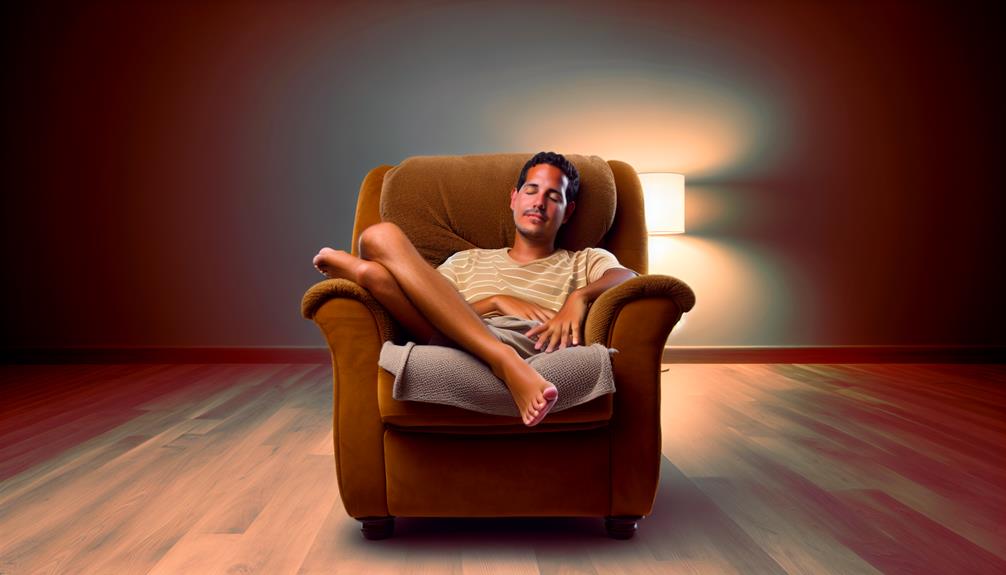Feeling a bit worn out and in need of a pick-me-up?
Well, we've got just the solution for you. Let's talk about the benefits of micro naps and how they can actually improve your health.
Now, I know what you're thinking – napping during the day? Isn't that just for lazy people?
But hold on, because the truth is, these short snoozes can be a game-changer when it comes to combating fatigue and boosting productivity.
And trust me, the advantages don't stop there.
So, if you're curious to find out how a quick power nap can revolutionize your well-being, stick around – you won't want to miss this.
What Are Micro Naps?

Micro naps, the key to revitalizing your energy levels and boosting productivity, are brief power naps that last anywhere between 10 to 20 minutes. These short snoozes have gained popularity due to their ability to provide a quick burst of energy and enhance alertness.
Unlike longer naps that children take, micro naps are specifically designed for adults. They offer a way to combat fatigue and increase productivity without leaving you feeling groggy afterwards.
It's important to note that micro naps differ from microsleep episodes, which occur involuntarily and can be dangerous. Micro naps, on the other hand, are voluntary and provide numerous benefits such as reducing stress, improving memory and cognitive function, and enhancing creativity.
Micro Naps Vs Microsleep Episodes
Microsleep episodes, unlike micro naps, can pose a danger as they occur involuntarily and can go unnoticed. While micro naps are voluntary and help with energy and alertness, microsleep occurs when sleep deprived and can last up to 30 seconds. This involuntary state of sleep can happen at any time, even when we're engaged in activities that require our full attention.
Here are four key differences between micro naps and microsleep episodes:
- Micro naps are intentional, while microsleep episodes are involuntary.
- Micro naps improve energy and alertness, while microsleep can make us feel groggy.
- Micro naps are short and controlled, while microsleep episodes can last up to 30 seconds.
- Micro naps are beneficial for our health, while microsleep episodes can be dangerous, especially when driving or operating machinery.
It's important to be aware of the difference between these two states and prioritize getting enough quality sleep to avoid the risks associated with microsleep episodes.
Benefits of Micro Napping

After understanding the potential dangers of microsleep episodes, it's crucial to explore the numerous benefits that micro napping can provide for our overall health and well-being.
Micro naps, those short power naps of 10 to 20 minutes, have been found to reduce fatigue and increase alertness. They can enhance productivity, reduce stress, and elevate mood.
Not only that, micro naps also improve memory and cognitive function, allowing us to think more clearly and make better decisions. And if you're looking to boost your creativity, micro napping can help with that too.
By taking a short snooze in the early afternoon, you can experience all of these benefits and more.
How to Take the BEST Micro Nap
To ensure you get the most out of your micro nap, follow these simple steps for a rejuvenating and productive rest:
- Take a 10-20 minute snooze in the early afternoon: This is the optimal time to recharge and combat that midday slump.
- Find a convenient time that fits into your schedule: Whether it's during your lunch break or a quick break between meetings, choose a time that works best for you.
- Set an alarm to avoid oversleeping: It's important to limit your nap to 10-20 minutes to prevent grogginess afterwards.
- Use a sleep mask to create a darker environment: Blocking out any potential light can help you relax and fall asleep faster.
Who Needs Micro Naps?

Now that we understand how to take the best micro nap, let's explore who can benefit from incorporating these rejuvenating power naps into their daily routine.
Micro naps aren't just for the sleep-deprived or those with sleep disorders. In fact, most adults can benefit from micro naps. If you find yourself feeling fatigued or lacking energy throughout the day, a quick 10 to 20-minute snooze can do wonders for your alertness and productivity.
Parents who've restricted sleep due to taking care of their children can also benefit from micro naps. Night shift workers, who often struggle with maintaining a regular sleep schedule, can find relief and improve their overall well-being with micro naps.
Frequently Asked Questions
Can Micro Naps Help With Chronic Insomnia?
Micro naps can be a helpful tool for managing chronic insomnia. By taking short, 10 to 20-minute power naps throughout the day, individuals with insomnia can reduce fatigue and increase alertness. These brief snoozes can also improve memory, cognitive function, and elevate mood.
However, it's important to note that micro naps shouldn't replace a proper sleep routine and other insomnia management strategies. Consulting with a healthcare professional is recommended for personalized advice.
Are Micro Naps Recommended for Children?
Micro naps aren't recommended for children.
While micro naps can be beneficial for adults by reducing fatigue, increasing alertness, and improving cognitive function, they differ from the longer naps that children take.
Adults may feel groggy if they nap longer than 20 minutes, but children need longer periods of sleep for proper development.
It's important to prioritize age-appropriate sleep schedules for children to ensure their overall health and well-being.
Can Micro Naps Replace a Full Night's Sleep?
Micro naps are a great way to recharge and boost productivity, but they can't replace a full night's sleep. While micro naps can provide a quick energy boost and improve alertness, they don't provide the same restorative benefits as a good night's sleep.
It's important to prioritize getting enough sleep each night to support overall health and well-being. Micro naps can be a helpful addition to your routine, but they shouldn't be relied upon as a substitute for proper sleep.
How Often Should One Take Micro Naps?
How often should we take micro naps?
The frequency of micro naps depends on individual needs and preferences. Some people find that taking a 10-20 minute snooze in the early afternoon is enough to recharge and increase productivity.
Others may benefit from taking micro naps more frequently throughout the day, especially if they're sleep-deprived or have demanding schedules.
It's important to listen to your body and find a rhythm that works best for you.
Can Micro Naps Affect Nighttime Sleep Patterns?
Micro naps, those short power naps of 10 to 20 minutes, can indeed affect nighttime sleep patterns. While they can provide a quick boost of energy and alertness during the day, taking micro naps too close to bedtime may make it harder to fall asleep at night.
It's best to schedule micro naps earlier in the day to avoid disrupting your sleep cycle. Finding the right balance is key to reaping the benefits of micro naps without compromising your nighttime rest.
Conclusion
In conclusion, incorporating micro naps into your daily routine can have a significant positive impact on your overall health and well-being. These short snoozes not only combat fatigue and increase alertness, but they also reduce stress, improve memory and cognitive function, and even stimulate creativity.
Whether you're sleep-deprived, a parent with limited sleep, a night shift worker, or someone with sleep disorders, taking micro naps can revolutionize your health and help you perform at your best throughout the day.
So why not give it a try and experience the amazing benefits for yourself?





